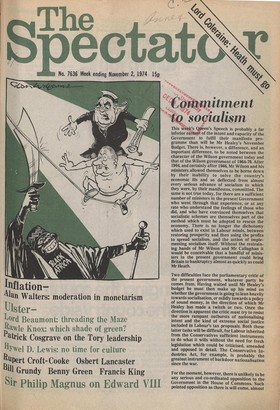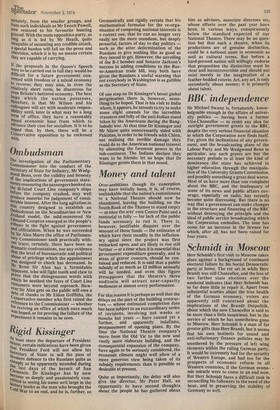CCir ttnent • to soinaltsm This week's Qaeen's Speech is probably
a far inferior earnest of the intent and capacity of the Government to fulfil their manifesto programme than will be Mr Healey's November Budget. There is, however, a difference, and an important difference, to be noted between the character of the Wilson government today and that of the Wilson government of 1964-70. After 1964, and certainly after 1966, Mr Wilson and his ministers allowed themselves to be borne down by their inability to solve the country's economic ills and so deflected from almost every serious advance of socialism to which they were, by their manifestos, committed. The same is not true today, for there are a sufficient number of ministers in the present Government who went through that experience, or at any rate who understand the feelings of those who did, and who have convinced themselves that socialistic schemes are themselves part of the method which must be adopted to rescue the economy. There is no longer the dichotomy which used to exist in Labour minds, between restoring prosperity and then using the profits to spread socialism, and the action of implementing socialism itself. Without the restraining hands of Mr Wilson and Mr Callaghan it would be conceivable that a handful of ministers in the present government could bring Britain to bankruptcy almost as quickly as could Mr Heath.
Two difficulties face the parliamentary critic of the present government, whatever party he comes from. Having waited until Mr Healey's budget he must then make up his mind on whether the government is going to lean heavily towards socialisation, or mildly towards a policy of sound money, in the direction of which Mr Healey has made a twitch or two. Once the direction is apparent the critic must try to resist the more rampant outbursts of nationalising intent and the kind of extreme social justice included in Labour's tax proposals. Both these latter tasks will be difficult, for Labour inherited from the Conservatives sufficient instruments to do what it wills without the need for fresh legislation which could be criticised, amended and opposed in detail. The Conservative Industries Act, for example, is probably the greatest instrument of backdoor nationalisation since the war.
For the moment, however, there is unlikely to be any serious and co-ordinated opposition to the Government in the House of Commons. Such pointed opposition as there is will come, almost certainly, from the smaller groups, and from such individuals as Mr Enoch Powell, now restored to his favourite hunting gound. With the main opposition party, as !Ong as it is led by Mr Heath, quite incapable of mounting any credible attack, a special burden will fall on the press and television, which it is by no means certain they are capable of carrying.
If the proposals in the Queen's Speech Were to be carried out in full they would be difficult for a future government con.. cerned with freedom or a mixed economy to reverse; they may also, in even the relatively short term, be disastrous for even Britain's battered economy. The best hope which the nation possesses, therefore, is that Mr Wilson and his c011eagues will act with moderate responsibility until, later in what may be a long term of office, they have a reasonably sound economic base from which to advance their case for socialism. It is to be hoped that, by then, there will be a Conservative opposition to be reckoned With.
Ombudsman
The investigation of the Parliamentary Commissioner into the conduct of the ecretary of State for Industry, Mr Wedgwood Benn, over the validity and honesty of the implications of government statements reassuring the passengers booked on he ill-fated Court Line company's ships Wore the company crashed, may well Produce material for judgement of considerable interest. After the long agitation in this country designed to establish an Ombudsman on the Scandinavian or New Zealand model, the mild-mannered Sir mund Compton emerged as the people's tribune in the fight against government and officialdom. When he was succeeded by Sir Alan Marre the office of Parliamentary Commissioner sank practically without trace; certainly, there have been no dramatic confrontations, nor any evidence that the level of bureaucratic and political abuse of privilege which the appointment ?as designed to check has decreased. In tva Benn Sir Alan has a formidable °Prionent, who will fight tooth and claw to Prove that the disingenuous words with Which he soothed the fears of Court Line Customers were beyond reproach. However Sir Alan gets on the public will owe a debt of thanks to Mr Eldon Griffiths, the Conservative member who first raised the reference to the Commissioner — whether Or reviving an office of which once much Was hoped, or for proving the failure of the experiment it remains to be seen.
16g. id Kissinger least since the departure of President thiNon, certain indications have been given at President Ford will not allow his ctetary of State to sell the pass of western defence to the Russians quite as tell"ply as he apparently intended during '1,e last days of the hermit of San ,2etriente. Dr Kissinger has by now 7coine so deeply and passionately comirted to seeing his name writ large in the 8,1-°rY books as the man who brought the °'d War to an end, and he is, further, so Germanically and rigidly certain that his mathematical formulae for the re-organisation of competing national interests is a correct one, that he can no longer very easily see the more mundane, but deeply powerful, factors of day to day politics — such as the utter determination of the Russians to give nothing like as good as they intend to get. However, the unveiling of the B-1 bomber and Senator Jackson's success in adding conditions to the Russo-American trade bill, may both have given the Russians a useful warning that not everybody in Washington is as gullible as the Secretary of State.
Of one stop on Dr Kissinger's latest global perigrination there is, however, something to be hoped. That is his visit to India where, it appears, he intends to try to make some slight amends for the incredible crassness and folly of the anti-Indian stand taken by the Americans during the Bangladeshi war. At that time Dr Kissinger and Mr Nixon quite unnecessarily sided with Pakistan, in order to be friends with China, not realising the terrible damage they could do to the American national interest by alienating the foremost power in the sub-continent. The Indians declare they want to be friends: let us hope that Dr Kissinger greets them in that mood.
Money and talent
Over-ambitious though its conception may have initially been, it is, of course, unthinkable that the nation's commitment to a National Theatre should now be abandoned, leaving the building on the South Bank of the Thames to stand empty — at once the arts' own Centre Point-and a memorial to folly — for lack of the public funds necessary to run it. There is, however, justifiable disquiet over the amount of those funds — the estimates of which have risen steadily in the inflationary spiral since the project was first embarked upon, and are likely to rise still further — at a time when it is essential that government expenditure generally, and in areas of graver concern, should be contained and reduced. It is said that a public subsidy of as much as E2 million annually will be needed, and even this figure presupposes that the theatre's three auditoria will attract near-capacity audiences at almost every performance.
For this reason it is perhaps as well that the delays on the part of the building contractors — whose estimated completion date has been subject to an extraordinary series of revisions, involving not weeks or months but years — have caused yet a further, and apparently indefinite, postponement of opening plans. By the time the National Theatre company's move from the Old Vic to the new and vastly more elaborate building, and the consequential expansion of the company, have again to be seriously considered, the economic climate might well allow of a more generous view being taken of its subsidy requirements than is possible or desirable at present.
Quite as importantly, the delay will also give the director, Mr Peter Hall, an opportunity to have second thoughts about the people he has gathered about him as advisers, associate directors etc, whose efforts over the past year have been, in various ways, conspicuously below the standard expected of our National Theatre. There may be no question but that such a theatre, when its productions are of genuine distinction, could be a national asset in economic as well as cultural terms. But before a hard-pressed nation will willingly endorse that proposition the distinction must be clear and incontrovertible and should not exist merely in the imagination of a feather-bedded coterie. Art, any art, is only secondarily about money; it is primarily about talent.
BBC independence
Sir Michael Swann is, fortunately, knowledgeable enough in the affairs of university politics — having been a former Vice-Chancellor — to resist any idea for outright government grants to the BBC, despite the very serious financial situation in which the Corporation now finds itself. For, given the inclinations of any government, and the broadcasting plans of the Labour Party and Mr Wedgwood Benn in particular, any such grants are but the necessary prelude to at least the kind of dominance the state has achieved in higher education through the manipulation of the University Grants Commission, and possibly something a great deal worse. Most of us have more than one complaint about the BBC, and the inadequacy of some of its news and public affairs coverage, especially on radio, has recently become quite distressing. But there is no way that a government can make changes in the structure and financing of the BBC without destroying the principle and the ideal of public service broadcasting which the Corporation embodies. The time has come for an increase in the licence fee which, after all, has not been raised for four years.
Schmidt in Moscow
Herr Schmidt's first visit to Moscow takes place against a background of continued electoral failure by his Social Democratic party at home. The rot set in while Herr Brandt was still Chancellor, and the loss of two further state elections over the weekend indicates that Herr Schmidt has so far done little to repair it. Apart from substantial worries about the true health of the German economy, voters are apparently still concerned about the implications of the Brandt Ostpolitik, about which the new Chancellor is said to be more than a little suspicious, but in the service of which he has nonetheless gone to Moscow. Herr Schmidt is a man of far greater gifts than Herr Brandt, but it seems that his own instincts for sound and anti-inflationary finance policies may be smothered by the pressure of left wing elements within the ruling German party. It would be extremely bad for the security of Western Europe, and bad too for the prospects of economic reform in all Western countries, if the German economic miracle were to come to an end now. But Herr Schmidt faces a difficult task in reconciling his followers to the need of the hour, and in preserving the stability of Germany as well.



































 Previous page
Previous page